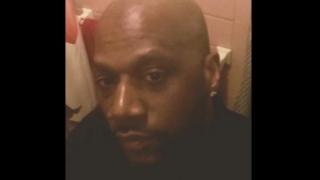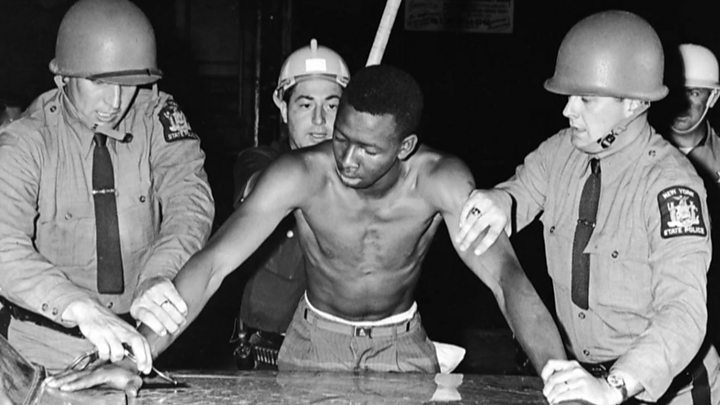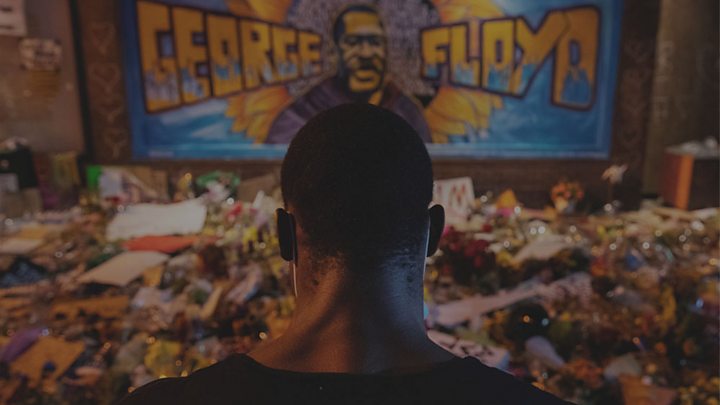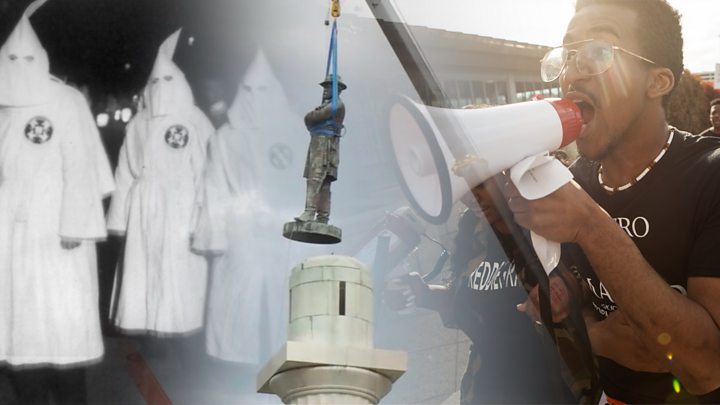This website uses cookies so that we can provide you with the best user experience possible. Cookie information is stored in your browser and performs functions such as recognising you when you return to our website and helping our team to understand which sections of the website you find most interesting and useful.
 Image copyright We The People/ GoFundMe
Image copyright We The People/ GoFundMeSeven US police officers have been suspended over the death of a black man who suffocated after being restrained.
Daniel Prude, who had mental health issues, died after being put in a "spit hood", which is meant to protect officers from detainees' saliva.
Announcing the suspension, Rochester's mayor, Lovely Warren, said systemic racism led to the death.
Mr Prude died in March but his death has only just been reported.
The 41-year-old died two months before George Floyd's killing, which sparked national and international protests against racism and police brutality. His arrest also bore similarities to Mr Floyd's, as both were pinned to the ground by officers.

Media playback is unsupported on your device
The move to suspend the seven officers is the first disciplinary action since Mr Prude's death. Contract rules mean the officers will still be paid while on leave, according to city officials.
What did the city authorities say?
Mayor Warren said at a news conference on Thursday: "I am suspending the officers in question today against council's advice, and I urge the attorney general to complete her investigation."
"Daniel Prude was failed by our police department, our mental healthcare system, our society and, he was failed by me," she continued.
She added that his death was proof "many of the challenges that we faced in the past are the same challenges that we face today".
The mayor said city police chief La'Ron Singletary had failed to inform her of the case until the beginning of last month.
The details only came to light on Wednesday after the police body camera video was released through a public records request.
Ms Warren said what she saw in the video was "entirely different" from how the police chief initially presented the incident to her - as a drug overdose.
The mayor said she was "deeply, personally and professionally disappointed" in Chief Singletary. She did not announce any action against him.
Chief Singletary denied on Wednesday that his department had been trying to keep the details out of public view.
"This is not a cover-up," he said, according to the New York Times.
He added: "Our job is to try to get some sort of medical intervention, and that's exactly what happened that night."
New York Attorney General Letitia James' office took over the investigation in April.
New York Governor Andrew Cuomo called for the case to be concluded "as expeditiously as possible".
How did Daniel Prude die?
Mr Prude's brother, Joe, has said he called police on 23 March as Daniel was showing acute mental health problems. When officers arrived, he had been running naked through the streets in a light snow.
Police body camera video obtained by the family shows Mr Prude lying on the ground as officers restrain him. Mr Prude, who was not carrying a weapon, can be seen complying with officers immediately.
While sitting on the road, he becomes agitated, alternately asking for money or a gun.
He swears at the officers who surround him - they can be heard apparently chuckling.
He spits repeatedly on the ground, but does not appear to offer any physical resistance, according to the footage.

Media playback is unsupported on your device
An officer says that Mr Prude told them he has Covid-19, and they place the spit hood on him.
One officer can be seen pressing down on Mr Prude's head with both hands, saying "stop spitting". Mr Prude stops moving and goes quiet, and officers note he feels cold.
Paramedics are called and Mr Prude is taken to hospital in an ambulance. His family took him off life support a week later on 30 March.
The Monroe County medical examiner ruled Mr Prude's death a homicide caused by "complications of asphyxia in the setting of physical restraint", according to a post-mortem examination.
The autopsy report also cited "excited delirium" and acute intoxication by phencyclidine, or the drug PCP, as contributing factors.
What happened before police arrived?
A warehouse worker and father-of-five, Mr Prude had travelled by train from his home in Chicago to visit his brother when the events that led to the fatal encounter unfolded.
About eight hours before he was approached by police, Mr Prude was taken to a hospital in Rochester for a mental health evaluation.

Media playback is unsupported on your device
He was released into the care of his brother, but soon began to act erratically again and then ran into the street and took off his clothes.
His brother told police Daniel had accused him of wanting to kill him and dived down to his basement head first, according to the New York Times.
Mr Prude's his aunt, Letoria Moore, told the Associated Press news agency her nephew had been hit hard by the deaths of his mother and two brothers over the years.
What are 'spit hoods' and why are they controversial?
"Spit hoods" are mesh fabric hoods placed over the heads of suspects. They are intended to protect officers from a detainee's saliva.
Critics who oppose their use say they are distressing and humiliating, can cause panic in the detained person, and make it harder to notice if a prisoner is having difficulty breathing.
In recent years, they have been scrutinised as a factor in the deaths of several detainees in the US and other countries.
In the UK, campaign group Liberty said that, as of February 2019, "spit hoods" were being used by at least 30 of the 43 police forces in England and Wales.
Back in 2016, UK police forces told the BBC they only used them when "proportionate, appropriate and justifiable" to protect officers. The Metropolitan Police says its medically supervised tests have found "spit hoods" present no risk to a suspect's breathing.



 Africana55 Radio
Africana55 Radio 
